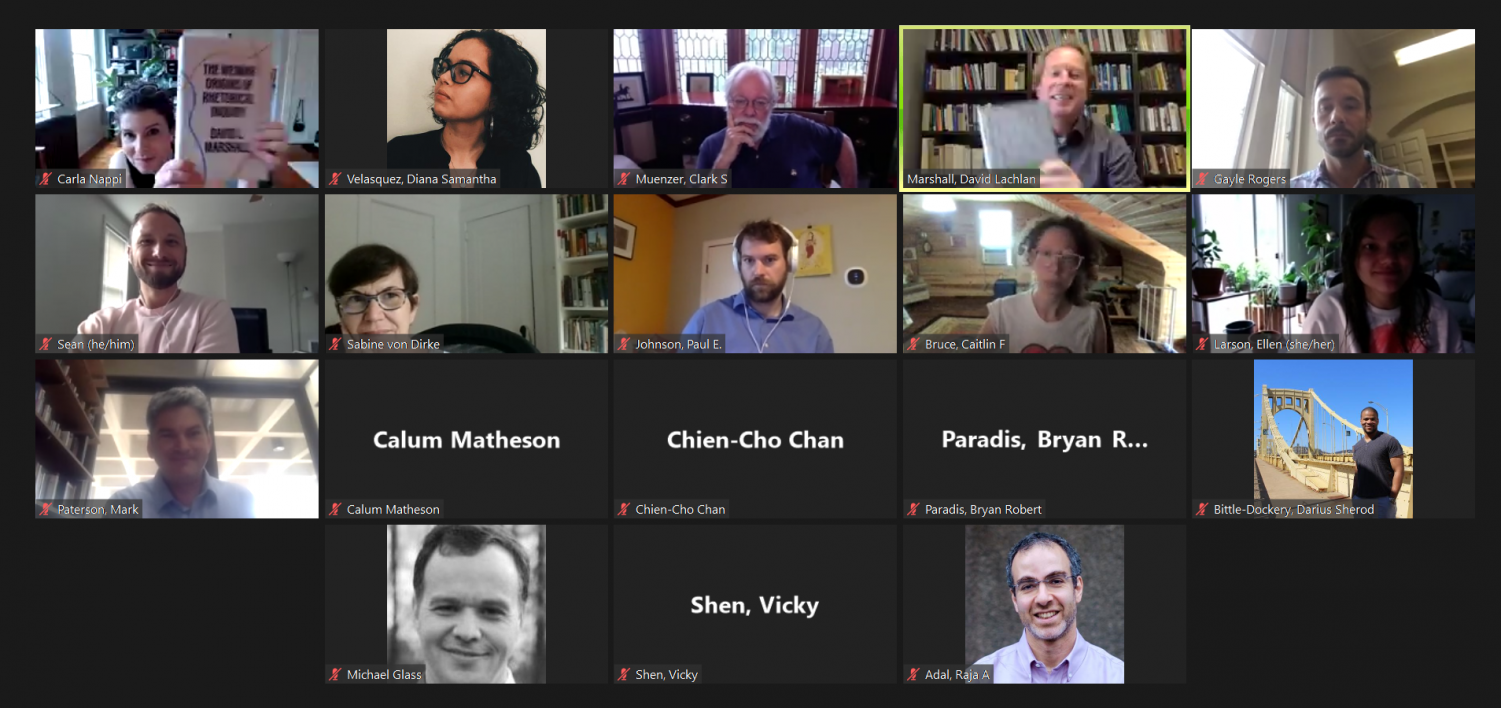Book Duet series fosters collaboration between published professors


Carla Nappi and David Marshall, co-directors of Pitt’s Humanities Center, are bringing together professors from across dozens of disciplines to talk about their published books, in a new series called “Book Duets,” the first of which aired on Zoom this Thursday.
“Humanities” is a broad term, and at universities like Pitt, departments that fall under it can range from sociology to English literature. How often do these departments and their faculty interact outside of larger gatherings?
Carla Nappi and David Marshall, co-directors of Pitt’s Humanities Center, are solving this problem with a new author series called “Book Duets.” In this series, they’re bringing together professors from across dozens of disciplines to talk about their published books.
The first Book Duet aired on Zoom this Thursday with Nappi and Marshall as its stars. They presented their recently published books — “Translating Early Modern China” and “The Weimar Origins of Rhetorical Inquiry” — with more talks planned throughout the school year.
But the series isn’t like any regular book launch — it’s a program geared at collaboration between the two authors. At the event, selections from both books were chosen by the opposing author to read aloud. Nappi chose a chapter from Marshall’s book, and Marshall chose a chapter from hers.
According to Nappi, this format is a part of fostering a larger community spirit among humanities authors at Pitt, in contrast to the typical and often intimidating spotlight authors are forced into for book launches.
“That’s how it’s typically done, is that you have one person who is being celebrated, and everyone kind of orbits around them,” Nappi said. “But what if, in this larger collaborative spirit that’s so important for our vision, we paired people together that both have new publications that otherwise might not be in conversation?”
This spirit of collaboration extends far past the event itself and is a vital part of the Humanities Center programming. Nappi said two years ago, when the center was looking for director applications, she and Marshall sent in a joint application to lead the center as “co-directors.”
“We applied as co-directors instead,” Nappi said. “And that was part of a larger vision for the Humanities Center that was very much about collaboration, and the importance of working together and thinking together, more than producing simply the sum of the parts.”
Marshall said even though he and Nappi operate in different departments at Pitt, there are similarities between their books, which he hopes will be the same for future authors in the series.
“Although I’m in the department of communication, and Carla is in the department of history, we’re actually both historians by training,” Marshall said. “And I think there are some really fascinating historical issues that come to the forefront here.”
Zachary Horton, an assistant professor of English literature, expressed a similar sentiment. At the event, he said great discussions were formed between the two books.
“This discussion is so exciting. I love this duet format and the conversations it’s bringing up,” Horton said.
Upcoming authors range from the department of classics to film studies. Nappi said last year, she and Marshall reached out to all the humanities departments in search of professors with recently published books. From there it was all about finding out which books, and most importantly, which people would pair well together.
“David and I really had like a few brainstorming sessions where we thought, ‘Okay, what could be a really interesting conversation, given the constellation of books that have been suggested to us?’” Nappi said. “How can we put those together in interesting ways? So not only do the books make sense together but like, do these people make sense together?”
Nappi said she and Marshall planned to go first in the series, specifically because they wanted to model how a successful book pairing can go.
“It’s to kind of model at least one example of what we’re imagining so that other people have at least some example when they are then going afterward,” Nappi said. “What we kind of have in mind and what might be possible.”
In terms of how Nappi and Marshall’s books paired together, Marshall said there is more in common between them than people might initially think.
“There’s some theoretical meditations in my book on how historians can write ideas and make them present and vital to readers in the contemporary world,” Marshall said. “And Carla’s book is very innovative, and sort of quite cutting edge in a number of ways in how she’s experimenting with the genres of presenting ideas from the past.”
Overall, the spirit of these events is to build on community bonds between humanities authors that might otherwise be neglected because of department boundaries. Nappi said no matter the authors’ book topics, the goal is to bridge the gap between disciplines.
“David’s book could have been about Hungarian basket weaving. And my book, it could have been like a cookbook for how to make banana bites into delicious dinners,” Nappi said. “We would have trusted that there will still be things to talk about. That’s kind of part of the fun of it. To create commonalities from a pairing where it’s not obvious what that commonality might be.”
Recent Posts
SGB introduces new governing code bill and addresses rumors of ICE on campus
At its weekly meeting at Nordy’s Place on Tuesday, Student Government Board introduced an omnibus…
Opinion | School should be in the summer
Although this may be controversial, I believe that from this data, it is evident that…
Weathering the storm: Pittsburgh teams have tackled some of the toughest environments
The end of the year in western Pennsylvania is always marked by two things —…
Notes From an Average Girl // Notes on Book Banning
In this edition of Notes From an Average Girl, senior staff writer Madeline Milchman writes…
To Be Honest // Yup, it is that damn phone
In this edition of To Be Honest, staff writer Evin Verbrugge writes about her phone…
Meaning at the Movies | Portraying Toxic ‘Adolescence’
In this edition of Meaning at the Movies, staff writer Lauren Deaton explores the mini-series…


